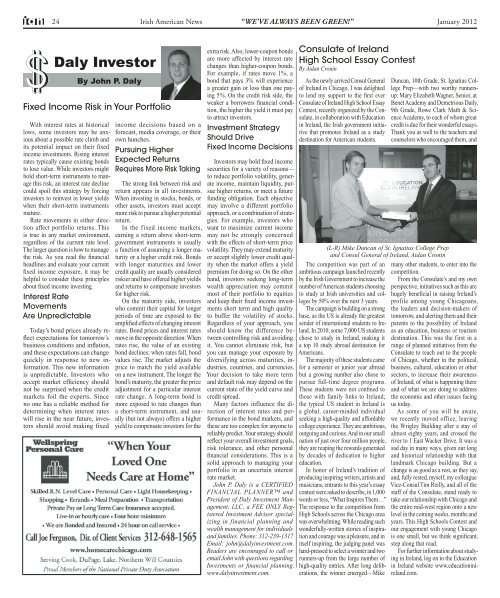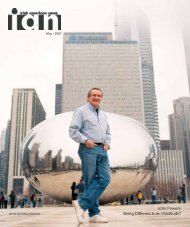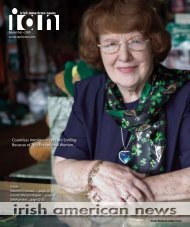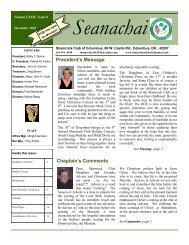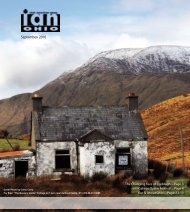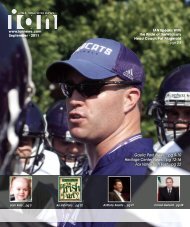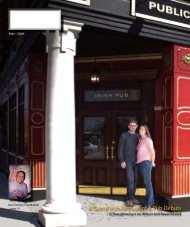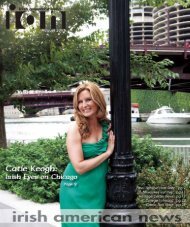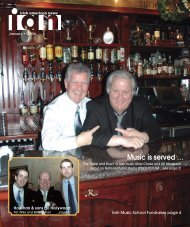Flogging Molly - Irish American News
Flogging Molly - Irish American News
Flogging Molly - Irish American News
You also want an ePaper? Increase the reach of your titles
YUMPU automatically turns print PDFs into web optimized ePapers that Google loves.
24 <strong>Irish</strong> <strong>American</strong> <strong>News</strong> “We’ve Always Been Green!” January 2012<br />
Daly Investor<br />
By John P. Daly<br />
Fixed Income Risk in Your Portfolio<br />
With interest rates at historical<br />
lows, some investors may be anxious<br />
about a possible rate climb and<br />
its potential impact on their fixed<br />
income investments. Rising interest<br />
rates typically cause existing bonds<br />
to lose value. While investors might<br />
hold short-term instruments to manage<br />
this risk, an interest rate decline<br />
could spoil this strategy by forcing<br />
investors to reinvest in lower yields<br />
when their short-term instruments<br />
mature.<br />
Rate movements in either direction<br />
affect portfolio returns. This<br />
is true in any market environment,<br />
regardless of the current rate level.<br />
The larger question is how to manage<br />
the risk. As you read the financial<br />
headlines and evaluate your current<br />
fixed income exposure, it may be<br />
helpful to consider these principles<br />
about fixed income investing.<br />
Interest Rate<br />
Movements<br />
Are Unpredictable<br />
Today’s bond prices already reflect<br />
expectations for tomorrow’s<br />
business conditions and inflation,<br />
and these expectations can change<br />
quickly in response to new information.<br />
This new information<br />
is unpredictable. Investors who<br />
accept market efficiency should<br />
not be surprised when the credit<br />
markets foil the experts. Since<br />
no one has a reliable method for<br />
determining when interest rates<br />
will rise in the near future, investors<br />
should avoid making fixed<br />
income decisions based on a<br />
forecast, media coverage, or their<br />
own hunches.<br />
Pursuing Higher<br />
Expected Returns<br />
Requires More Risk Taking<br />
The strong link between risk and<br />
return appears in all investments.<br />
When investing in stocks, bonds, or<br />
other assets, investors must accept<br />
more risk to pursue a higher potential<br />
return.<br />
In the fixed income markets,<br />
earning a return above short-term<br />
government instruments is usually<br />
a function of assuming a longer maturity<br />
or a higher credit risk. Bonds<br />
with longer maturities and lower<br />
credit quality are usually considered<br />
riskier and have offered higher yields<br />
and returns to compensate investors<br />
for higher risk.<br />
On the maturity side, investors<br />
who commit their capital for longer<br />
periods of time are exposed to the<br />
amplified effects of changing interest<br />
rates. Bond prices and interest rates<br />
move in the opposite direction: When<br />
rates rise, the value of an existing<br />
bond declines; when rates fall, bond<br />
values rise. The market adjusts the<br />
price to match the yield available<br />
on a new instrument. The longer the<br />
bond’s maturity, the greater the price<br />
adjustment for a particular interest<br />
rate change. A long-term bond is<br />
more exposed to rate changes than<br />
a short-term instrument, and usually<br />
(but not always) offers a higher<br />
yield to compensate investors for the<br />
extra risk. Also, lower-coupon bonds<br />
are more affected by interest rate<br />
changes than higher-coupon bonds.<br />
For example, if rates move 1%, a<br />
bond that pays 3% will experience<br />
a greater gain or loss than one paying<br />
5%. On the credit risk side, the<br />
weaker a borrowers financial condition,<br />
the higher the yield it must pay<br />
to attract investors.<br />
Investment Strategy<br />
Should Drive<br />
Fixed Income Decisions<br />
Investors may hold fixed income<br />
securities for a variety of reasons—<br />
to reduce portfolio volatility, generate<br />
income, maintain liquidity, pursue<br />
higher returns, or meet a future<br />
funding obligation. Each objective<br />
may involve a different portfolio<br />
approach, or a combination of strategies.<br />
For example, investors who<br />
want to maximize current income<br />
may not be strongly concerned<br />
with the effects of short-term price<br />
volatility. They may extend maturity<br />
or accept slightly lower credit quality<br />
when the market offers a yield<br />
premium for doing so. On the other<br />
hand, investors seeking long-term<br />
wealth appreciation may commit<br />
most of their portfolio to equities<br />
and keep their fixed income investments<br />
short term and high quality<br />
to buffer the volatility of stocks.<br />
Regardless of your approach, you<br />
should know the difference between<br />
controlling risk and avoiding<br />
it. You cannot eliminate risk, but<br />
you can manage your exposure by<br />
diversifying across maturities, industries,<br />
countries, and currencies.<br />
Your decision to take more term<br />
and default risk may depend on the<br />
current state of the yield curve and<br />
credit spread.<br />
Many factors influence the direction<br />
of interest rates and performance<br />
in the bond markets, and<br />
these are too complex for anyone to<br />
reliably predict. Your strategy should<br />
reflect your overall investment goals,<br />
risk tolerance, and other personal<br />
financial considerations. This is a<br />
solid approach to managing your<br />
portfolio in an uncertain interest<br />
rate market.<br />
John P. Daly is a CERTIFIED<br />
FINANCIAL PLANNER and<br />
President of Daly Investment Management,<br />
LLC, a FEE ONLY Registered<br />
Investment Advisor specializing<br />
in financial planning and<br />
wealth management for individuals<br />
and families. Phone: 312-239-1317<br />
Email: john@dalyinvestment.com.<br />
Readers are encouraged to call or<br />
email John with questions regarding<br />
Investments or financial planning.<br />
www.dalyinvestment.com.<br />
Consulate of Ireland<br />
High School Essay Contest<br />
By Aidan Cronin<br />
As the newly arrived Consul General<br />
of Ireland in Chicago, I was delighted<br />
to lend my support to the first ever<br />
Consulate of Ireland High School Essay<br />
Contest, recently organized by the Consulate,<br />
in collaboration with Education<br />
in Ireland, the <strong>Irish</strong> government initiative<br />
that promotes Ireland as a study<br />
destination for <strong>American</strong> students.<br />
The competition was part of an<br />
ambitious campaign launched recently<br />
by the <strong>Irish</strong> Government to increase the<br />
number of <strong>American</strong> students choosing<br />
to study at <strong>Irish</strong> universities and colleges<br />
by 50% over the next 3 years.<br />
The campaign is building on a strong<br />
base, as the US is already the greatest<br />
sender of international students to Ireland.<br />
In 2010, some 7,000 US students<br />
chose to study in Ireland, making it<br />
a top 10 study abroad destination for<br />
<strong>American</strong>s.<br />
The majority of these students came<br />
for a semester or junior year abroad<br />
but a growing number also chose to<br />
pursue full-time degree programs.<br />
These students were not confined to<br />
those with family links to Ireland;<br />
the typical US student in Ireland is<br />
a global, career-minded individual<br />
seeking a high-quality and affordable<br />
college experience. They are ambitious,<br />
outgoing and curious. And in our small<br />
nation of just over four million people,<br />
they are reaping the rewards generated<br />
by decades of dedication to higher<br />
education.<br />
In honor of Ireland’s tradition of<br />
producing inspiring writers, artists and<br />
musicians, entrants to this year’s essay<br />
contest were asked to describe, in 1,000<br />
words or less, “What Inspires Them…”<br />
The response to the competition from<br />
High Schools across the Chicago area<br />
was overwhelming. While reading such<br />
wonderfully-written stories of inspiration<br />
and courage was a pleasure, and in<br />
itself inspiring, the judging panel was<br />
hard-pressed to select a winner and two<br />
runners-up from the large number of<br />
high-quality entries. After long deliberations,<br />
the winner emerged—Mike<br />
Duncan, 10th Grade, St. Ignatius College<br />
Prep—with two worthy runnersup:<br />
Mary Elizabeth Wagner, Senior, at<br />
Benet Academy and Demetrious Daily,<br />
9th Grade, Rowe Clark Math & Science<br />
Academy, to each of whom great<br />
credit is due for their wonderful essays.<br />
Thank you as well to the teachers and<br />
counselors who encouraged them, and<br />
(L-R) Mike Duncan of St. Ignatius College Prep<br />
and Consul General of lreland, Aidan Cronin<br />
many other students, to enter into the<br />
competition.<br />
From the Consulate’s and my own<br />
perspective, initiatives such as this are<br />
hugely beneficial in raising Ireland’s<br />
profile among young Chicagoans,<br />
the leaders and decision-makers of<br />
tomorrow, and alerting them and their<br />
parents to the possibility of Ireland<br />
as an education, business or tourism<br />
destination. This was the first in a<br />
range of planned initiatives from the<br />
Consulate to reach out to the people<br />
of Chicago, whether in the political,<br />
business, cultural, education or other<br />
sectors, to increase their awareness<br />
of Ireland, of what is happening there<br />
and of what we are doing to address<br />
the economic and other issues facing<br />
us today.<br />
As some of you will be aware,<br />
we recently moved office, leaving<br />
the Wrigley Building after a stay of<br />
almost eighty years, and crossed the<br />
river to 1 East Wacker Drive. It was a<br />
sad day in many ways, given our long<br />
and historical relationship with that<br />
landmark Chicago building. But a<br />
change is as good as a rest, as they say,<br />
and, fully rested, myself, my colleague<br />
Vice-Consul Tim Reilly, and all of the<br />
staff of the Consulate, stand ready to<br />
take our relationship with Chicago and<br />
the entire mid-west region onto a new<br />
level in the coming weeks, months and<br />
years. This High Schools Contest and<br />
our engagement with young Chicago<br />
is one small, but we think significant,<br />
step along that road.<br />
For further information about studying<br />
in Ireland, log on to the Education<br />
in Ireland website www.educationinireland.com.


